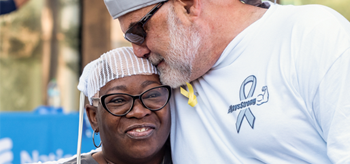Brain surgery is a lot for the body to handle, and recovery from brain surgery can be a stressful time for patients and their loved ones.
To ensure that patients are safe immediately after brain surgery, they generally stay in the hospital for observation anywhere from a few days to over a week.
During that time, patients often receive steroids to decrease swelling in the brain and anti-seizure medication to prevent seizures. The medications may be adjusted based on symptoms and side effects, so it is important for patients and their caregivers to alert the health care team of any concerns.
After brain surgery, some patients may need rehabilitation to regain certain functions and activities of daily living. Rehabilitation may include working with physical therapists (PT), occupational therapists (OT), speech therapists, and other specialists depending on each patient’s unique needs.
Before patients are discharged from the hospital, it is important for them and their loved ones to discuss the discharge plan with the health care team. The discharge plan should include instructions for proper wound care, a list of medications to take after discharge, rehabilitation services needed after discharge, a schedule of follow-up appointments, and a list of concerns about when to call the doctor.
Once home, services after discharge might include receiving care from a visiting nurse association (VNA), personal care attendant (PCA), in-home physical therapist (PT), and more. Patients may need support with transportation, medication reminders, and child care. Also, patients and caregivers may need extended time off from work during this time.
Learn More About the Family and Medical Leave Act (FMLA)
The Family and Medical Leave Act (FMLA) provides unpaid leave and job protection to eligible employees with serious health conditions. It also provides protection to people who need to care for a spouse, parent, or child with a serious health condition.
People with brain tumors and members of their family may qualify for FMLA depending on their employer and proper medical certification from a health care provider.
If the employer is covered by FMLA and if the employee’s FMLA leave is approved, FMLA leave can be taken for a total of 12 work weeks in a 12-month period. Covered service members and their caregivers may be eligible for up to 26 work weeks of FMLA leave in a 12-month period through military caregiver leave.
During an FMLA leave, employees need to maintain their medical insurance policy if it is through their employer, as if they have continued working even though they’re not.
Employees may take FMLA leave intermittently when medically necessary, which means taking separate blocks of time for a single qualifying reason as needed. They may also take FMLA leave on a reduced leave schedule, which means reducing the employee’s usual daily or weekly work schedule.
If you believe that you or someone you care for may be eligible for FMLA leave, please speak to your employer and/or your health care team for more information.
Recovery from brain surgery can take time, and some people may experience long-term and permanent side effects. Please speak with your neurosurgeon and health care team about any concerns.
Additional Resources
Palliative Care
NBTS Personalized Support and Navigation
Brain Tumor Support Conversations
Family and Medical Leave Act (FMLA)


